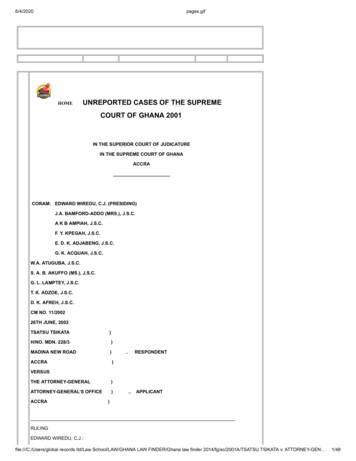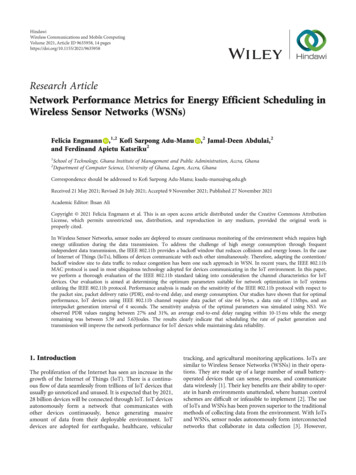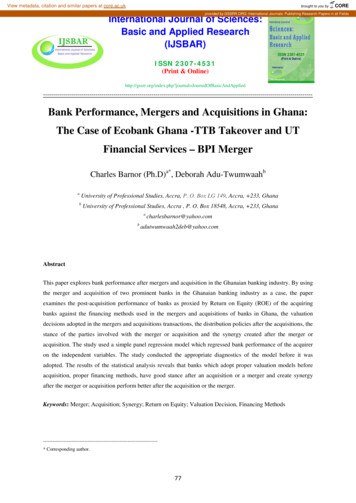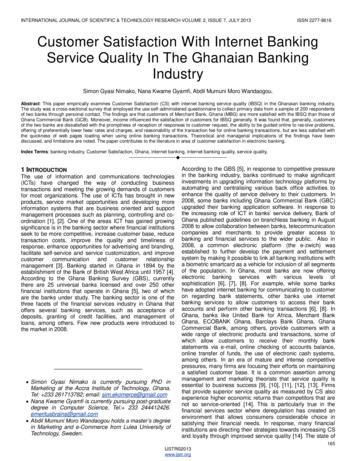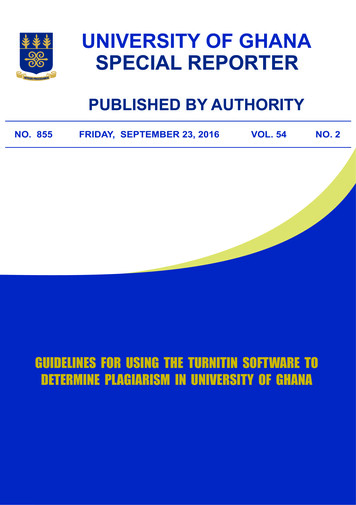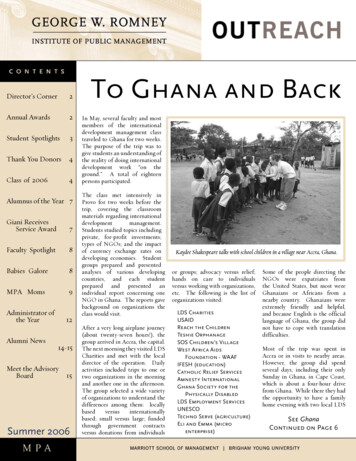
Transcription
Director’s Corner2Annual Awards2Student Spotlights3Thank You Donors4Class of 20064Alumnus of the Year 7Giani ReceivesService Award7Faculty Spotlight8Babies Galore8MPA Moms9Administrator ofthe YearAlumni News1214-15Meet the AdvisoryBoard15Summer 2006To Ghana and BackIn May, several faculty and mostmembers of the internationaldevelopment management classtraveled to Ghana for two weeks.The purpose of the trip was togive students an understanding ofthe reality of doing internationaldevelopment work “on theground.” A total of eighteenpersons participated.The class met intensively inProvo for two weeks before thetrip, covering the classroommaterials regarding internationaldevelopmentmanagement.Students studied topics includingprivate, for-profit investments;types of NGOs; and the impactof currency exchange rates ondeveloping economies. Studentgroups prepared and presentedanalyses of various developingcountries, and each studentprepared and presented anindividual report concerning oneNGO in Ghana. The reports gavebackground on organizations theclass would visit.After a very long airplane journey(about twenty-seven hours!), thegroup arrived in Accra, the capital.The next morning they visited LDSCharities and met with the localdirector of the operation. Dailyactivities included trips to one ortwo organizations in the morningand another one in the afternoon.The group selected a wide varietyof organizations to understand thedifferences among them: locallybasedversusinternationallybased; small versus large; fundedthrough government contractsversus donations from individualsKaydee Shakespeare talks with school children in a village near Accra, Ghana.or groups; advocacy versus relief;hands on care to individualsversus working with organizations,etc. The following is the list oforganizations visited:LDS CharitiesUSAIDReach the ChildrenTeshie OrphanageSOS Children’s VillageWest Africa AidsFoundation - WAAFIFESH (education)Catholic Relief ServicesAmnesty InternationalGhana Society for thePhysically DisabledLDS Employment ServicesUNESCOTechno Serve (agriculture)Eli and Emma (microenterprise)Some of the people directing theNGOs were expatriates fromthe United States, but most wereGhanaians or Africans from anearby country. Ghanaians wereextremely friendly and helpful,and because English is the officiallanguage of Ghana, the group didnot have to cope with translationdifficulties.Most of the trip was spent inAccra or in visits to nearby areas.However, the group did spendseveral days, including their onlySunday in Ghana, in Cape Coast,which is about a four-hour drivefrom Ghana. While there they hadthe opportunity to have a familyhome evening with two local LDSSee GhanaContinued on Page 6
Director’s CornerPreparing New Leaders and ManagersWritten by Gary Cornia, Directorcurriculum.During myt we nt y-f i veyears on thefacultyofthe RomneyInstituteofPublicManagement,one of themost constantelements ofchangehasbeentheOver the years, this has resulted in a numberof important changes in what and how weteach. Perhaps the most fundamental changein the curriculum was instigated in the early’80s when the faculty, under the directionof Lennis Knighton, redesigned the MPAcourses to reflect a strong management focusin the required courses. This redesign waspartially motivated by the inclusion of theRIPM in the newly formed Graduate Schoolof Management at BYU and partially becausethe faculty believed that a very importantdistinction a BYU MPA graduate neededwas the ability to be a manager.encounter courses designed to prepare themfor management in their chosen specialty.The motivation to be a leader in preparingstudents to become managers in public andnon-profit organizations continues to be theprimary focus of the RIPM. In comparingour required classes to virtually any otherMPA program, one will find a distinctivefocus on managing complex public and nonprofit organizations. For example, we are oneof only a few programs that devotes an entirecourse to governmental accounting. Thisis in addition to a course in public and nonprofit budgeting. The same can be said forour focus on human resources managementand management analysis. We are committedto preparing our students to consistentlybe ready for management and leadershippositions.We have just completed revisions of theMPA and EMPA curriculums. The changesadopted were designed to even better prepareour graduates to be leaders and managersand to continue our distinctive niche inpublic management education. Every facultymember in the RIPM is committed topreparing our students to be competitive forevery position throughout their professionalcareer. We don’t go through change just forthe sake of change. We undergo changes toincrease the value that we add to the skill setsof our graduates.The same model is used in our variousareas of emphasis. Regardless of students’decisions to focus on city management,human resource management, managerialanalysis, or non-profit management, they willBut we are not done with curriculum changes.Over the next several semesters, the RIPMwill be part of a Marriott School initiative toformalize learning outcomes in each class weteach and in the entire RIPM program. Thefaculty welcome this opportunity to sharpenthe focus of our classes and the skills of ourgraduates. It is a challenge from the MarriottSchool Dean’s Office that we believe willmake us a better program. vAnnual AwardsFaculty of the Year AwardsFirst- and second-year students votedseparately for the professor they wantedto honor as the faculty of the year. Firstyear students presented their award toBill Baker, who teaches communicationscourses. Second-year students honored CarlHernandez, a dean at BYU’s law school, whoteaches state and local government law.Karl N. Snow AwardRebecca Bracken received the Karl N.Snow award for highest GPA in the MPAgraduating class. The award is calculatedon program GPA through the semesterbefore graduation. Bracken is from Layton,Utah. She emphasized in finance and is nowworking for Sandy City as a managementanalyst. Karl N. Snow was an early leader of the MPAprogram at BYU and a former director ofthe institute as well. He also was a founderof the National Association of Schools ofPublic Affairs and Administration.Lennis M. Knighton AwardLynnett Gardner received the Lennis M.Knighton award for the EMPA graduatingstudent with the highest GPA. This awardis also based on program GPA through thesemester beforegraduation. Gardner is fromOrem, Utah, and currently works as anEnglish teacher at Lone Peak High School.Lennis M. Knighton was the third director ofthe institute and oversaw the development ofthe executive program.Lennis Knighton and Lynnett Gardner,recipient of the Lennis M. Knighton Award.Stewart L. Grow AwardCheya Wilson received the 2006 Stewart L.Grow award. The recipient is named by theinstitute faculty as the second-year studentwho exemplifies the characteristics of StewartSee AwardsContinued on Page 13
Student SpotlightsBarbara LeavittEMPA 2008B a r b a r aLeavitt, a firstyear EMPAstudent,movedherfamily fromtheirhomein Downey,Ca lifornia,toProvoshortly afterher husbandpassed awaywith cancer. Leavitt had experienced firsthand the gifts of service and care othersprovided during her husband’s difficult battlewith cancer and the superb treatment receivedat City of Hope in Duarte California. Onereason for choosing the EMPA program wasthat Leavitt wanted to gain the knowledgeand ability to assist others during extremelydifficult times, just as she had been. Barbaradetermined the program would provide thefoundation and skills to pursue a managementcareer in an organization where employeesplay a critical role in helping others on a dayto-day basisThe communication and presentation skillsLeavitt developed during her undergraduatestudies as a marketing student proveduseful during the last twenty-one years withher husband managing a family business,raising four daughters, and responding toher community when she saw areas needingassistance. Leavitt played a pivotal role inher children’s schools by forming educationalclubs, managing a campaign to raise funds forthe schools, and working with other parentsto gain and improve their parenting skills.Her family developed and maintained forsixteen years a baseball league for disabledchildren in their area. Her family’straditional Thanksgivingdinner for thepast eight years has been spent feeding agathering of more than seven-hundred people.“My husband and I always felt we shouldinstill in our children their responsibilityto reach out to others,” she says She has alsohad the opportunity to improve her teachingskills through the church as an institute andseminary instructor in California. “I foundworking with young people to be challengingbut also extremely rewarding. We haveamazing youth in the church, interested inmaking significant positive impacts to thisworld.”where the only internship prospect was withPurina Dog Chow, he quickly changed hismind. He wanted something that would makehim happy and excited about his future.Building on a rich life experience, her firstyear in the EMPA program has providedpositive educational challenges. Leavitt is alsoexcited that she and her oldest daughter willbe graduating from BYU in their respectiveprograms in the same year.During his time at Utah State, Parsonsworked part time at the local Boys & GirlsClub, an after school and summer programfor youth. Upon returning to Utah, hisformer boss recruited him to work as theorganization’s program director. After ayear in this position he was selected as theexecutive director for the Boys & Girls Clubsof Utah County. He has been in this positionfor more than two years.Weston ParsonsEMPA 2007W e s t o nP a r s o n ssoughtouttheEMPAprogramatBYU due tohisfather’s,inf luence(Bob Parsons,f o r m e rdirectorofthe RomneyInstitute). Parsons attended Utah StateUniversity, where he began pursuing abusiness degree in hopes of eventually earningan MBA. However, after attendinga career fair forinternshipsFollowing this discovery, he changed hismajor and earned a bachelor’s degree inelementary education, and in psychology.Parsons spent time teaching elementaryschool in Las Vegas and Logan, and returnedto Utah to begin working on a master of publicadministration and seek his educationalleadership endorsement to become a principal.Parsons is passionate about serving youth,especially those who need extra assistance andservices. He loves the opportunity to workwith the youth daily, create programmingthat meets their current and future needs,and develop an organization using hisentrepreneurial instincts.Parsons is the father of two children (Gracie,3 ½, and Logan, 22 months), and married tohis lovely wife, Jane. They reside in Santaquin,Utah. vVisit PastOutreach Newsletters atmarriottschool.byu.edu/mpa/newsletters.cfm
Thank You 2005 DonorsWilliam HansenGaylen & Diane LawyerKent ColtonGary CorniaJay CovingtonJohn DarringtonMichelle DorroughAlbert HainesPaul JacksonRobert AdamsSonny AltmanChyleen ArbonMax BakerMichael BennettDelora BertelsenMason BishopMargaret BlackhamRebecca BrackenCorine BradshawChristopher BradyNeil BradyWalter Lewis EstateMitt RomneyRoy JespersenKevinJonesDeanna KerrKimball Hill Homes FundTamara LewisRonald MaloufRobin RiggsVincent BreglioJeffrey ButlerDavid ClarkKevin ClaytonKathleen CloseScott ClowardSherman ClowardSteve ClowardChris CoonsCatherine CooperKent CooperYukari CrummettMark DalleyRoger DibbKen DriggsRex FacerWarren FisherWellPoint FoundationMerrill GappmayerSidney GilbertRobert GossGary GustafsonBrad HalesTanya HarmonCraig RobinsonKim SmithRobert TonkinsonRobert TooneBancorp USOlene WalkerKimball YoungDavid HartDavid HarwardPatricia JohansonDavid KofordReed LarsenDerik LeavittBradley LeBaronYi LiColleen McCannRandy McKnightDerek MillerLoretta MonarengCongratulations Scott AmbroseRebecca AmonJoseph AsbellRyan BatemanJay BaughmanMichael BennettRichard BondRebecca BrackenPeter BradshawCurtis BurkSpencer BurtonJared ChristensenCatherine CooperSuzanne DraperRyan EckardtAnn EvesHutch FaleJane FergusonKatrina FrederickJared GardnerLynnett GardnerRonald GardnerAida GomezTimothy GouldLeonardo GramajoScott GreenhalghBrad HalesDenise HaneyDarrin HardingJay HawkinsJulie HumberstoneElaine JarvieJoel JenksMaria JensonNolaMae JohanssonMarshall JohnsonMatthew JohnsonAbe KaderMichelle KearnsReed LarsenBryan LaytonRachel MaglebyStephanie MakiheleMelanie McCubbinsRubin McDougal
Bryan MontgomeryDon NortonJoseph OgdenVicki OkerlundBoyd ParsonsConnie ParsonsKeith ParsonsRichard ParsonsRobert ParsonsWeston ParsonsRichard PerkinsSeth PerrinsEllis PettigrewAdam PfostKelly PfostGeorgeann PopeRonald PurcellSam RacadioCharles RichardsKent SagerKristie SeawrightScott SellersRichard SmithStewart SmithMichael StapleyGregory StewartKathleen StimpsonDebra StockErnest SuttonSteve ThackerJed ThompsonJeffrey ThompsonBill ThomsonDennis WengertChad WestoverGloria WheelerDon WoodMelanie WoodDonald AdolphsonJJ AllenMark AllredSteven AllredConrad AnhderJohn AverettWally BairdSam BaxterStephen BensonPatricia BersieJudith BrackettPat BrannRalph BritschPreston BrownSarah BuckAmy ButlerBret ButlerDonna BywaterHoward ChandlerLisa ChristensenVern ChristensenKevin ClowardJennifer CobiaDavid ConnellyDarrell CookCharles CorderAngela CraigScott DarringtonReece DeMilleMatthew DixonRonald DunnTy ElliottRussell EvansMichael FazioMark FellowsJane FergusonErica FordianiKatrina FrederickGeorge FredericksonCynthia GladMichael GlennTerry GreenVai HafokaDaniel HarrisonDaniel HechtErin HerzogLaura HindmarshElaine JarvieNolaMae JohanssonJames KemerSpencer KyleGary LairdMeldon LarsonBarbara LeavittEdwin LeeJune LeifsonAnne LiechtyDavid LonghurstDonald LovelaceRachel MaglebyLinda MakinJeffrey ManleyMegan McAllisterMelanie McCubbinsBrooke McIlvainRichard MeyersChristopher MiasnikMatthew MichaelisBrian MieleNyla MillerReid MillerbergSiobhan OllivierreJohn ParksAid Perez GomezPaula PiccioniLeRoy PierceAmelia PinegarLauren RainsJoshua SalisburyScott SangbergBecca ShimBruce SlaterLeslie SmithMelody StaufferJamie SteckMark SteinagelMarilyn StevensStanley StrebelKent StreulingKenneth TaylorJames ThomasKarl TuellerScott Van KampenDoral VanceLiliana VercellottiLori WadsworthCalvin WendelboeCathy WiesCheya WilsonRyan WimmerRandell WinspearAndrea WorthenMillard WyattPeggy YoungClass of 2006Jenifer McGillMatthew MichaelisBrian MieleEmily MillerLoretta MonarengScott MooreColby MorrisMary Karlee MullenJohn ObinyanLisa PalettaBrent PearsonSeth PeaseMaria PedrozaAdam PfostKelly PfostPaula PiccioniAmelia PinegarElizabeth PrattLauren RainsApril RileyJeffrey RobbKimberly RodelaSamuel SanftJeffrey SellersTroy SimpsonTyler SmithSolomon SogunroErin SanofskyEugena SorensenSusan StephensonMatthew SwensonAshley TheodoreJoel ThompsonLiliana VercillottiMaria VeraMarie WhitakerCathy WiesCheya WilsonJulie WilliamsRichard WinsorLance WollebaekMelanie WoodAndrea Workman
GhanaContinued From Page 1families. The group visited the Kakum National Park,(a rain forest) and also visited two of the old slave castles,Elmina and Cape Coast Castle, both of which have beendeclared World Heritage Sites.Although most of their time was spent in visits to the variousNGOs, the travelers took time one afternoon to attenda temple session. One of the workers that day was SisterAppiah, the mother of Isaac Appiah, an MPA graduate of afew years ago. The group also took time to visit a botanicalgarden and do some shopping. This trip allowed all whowent an opportunity to understand nonprofit work in Africain a way that could never be obtained by just studying aboutit in Provo. vKristi Seawright’s international development management classnear the Accra, Ghana Temple.Students dancing with the Bamboo Orchestra, a local music and dance group.Kaydee Shakesphere with Aduja.Rachel Magleby walks with a Ghanian woman while on a trip with SOS Village.
Alumnus of the YearJonathan H. GardnerJonathan H. Gardner was honored as therecipient of the 2006 N. Dale WrightDistinguished Alumnus award on 7 April2006 at a banquet held at the Joseph SmithMemorial Building in Salt Lake City.Students, faculty, and staff from the GeorgeW. Romney Institute of Public Management,family members and friends of the Gardnerfamily gathered to honor his service, career,leadership, and example.The award is named after N. Dale Wright, aformer professor and department chair of theinstitute. It is given annually to an alumnuswho has demonstrated extraordinary serviceand leadership in the work environment andcommunity, has been an active communityvolunteer, has maintained and exhibitedhigh standards of excellence, and has gainedthe respect and loyalty of colleagues, peers,and family. Nominations for the award areaccepted from both faculty and alumni.Gardner has served in several veryresponsible positions within the VeteransHealth Administration for the Departmentof Veterans Affairs for more than twenty-sixyears. He is currently the chief executiveofficer of the Southern Arizona VA HealthCare System.Additionally, Gardnerhas received numerous national awardsbased on competition with other VA andfederal health care executives. Gardner hascontributed significantly to improvementsin the VA health care system, a system thatcurrently is setting the industry standardfor quality health care delivery. The VAhealth care system has become an effectivegovernment organization that is meeting thecharge to provide quality health care to menand women honorably discharged from ournations military—those who have answeredtheir country’s call to duty so Americans canenjoy the rights and freedoms guaranteed bythe constitution.One of the persons to nominate Gardner wasDan L. Johnston, area emergency managerof the Southern Arizona VA Health CareSystem. As part of his nomination, Johnstonwrote, “Jonathan led and coordinatedthe implementation of an entirely neworganizational structure, which resulted in thereduction from thirty-three services to elevennew service/care lines. He orchestrated thereorganization by involving the service chiefs,Jonathan Gardner speaks at the award ceremony.many of whom, based on his leadership andmanagement style, voluntarily agreed to stepdown from their management positions. Thereorganization resulted in a more efficientand effective health care system and improvedhealth care for veterans as documented bynationally conducted patient surveys.”Gardner received a BA degree in 1978 and amaster of public administration in 1980. Hehas also completed advanced studies at theYale School of Organization Management. vGiani Receives Service AwardFrancine Giani (left center) with facultyand staff of the Romney Institute.On Friday, 2 June 2006, Francine Giani,executive director of Utah Departmentof Commerce, was honored by the UtahChapter of the American Society for PublicAdministration. Gloria Wheeler, the RomneyInstitute’s associate director, presented Gianiwith the G. Homer Durham DistinguishedService Award, which honors appointedofficials who have served the public withhonor and integrity, as did Durham. Durhamhad an illustrious career serving in numerouspositions at the University of Utah, amongwhich were director of the Institute ofGovernment, vice president of the Universityand president of Arizona State University.He also served as the national president ofASPA from 1959 to 1960.Giani, who earned her EMPA in 1991, beganserving as director of the Utah Divisionof Consumer Protection in 1991.Inaddition to general regulation of deceptivebusiness practices, the division registersand regulates specific industries iness opportunities, credit repair, debtmanagement, health spas, and private careerschools. The division negotiates settlements toprovide restitution to hundreds of consumerseach year. Giani regularly makes speeches,produces public service announcements, andissues press releases to educate the publicabout consumer protection issues.Giani is married to Rick Luczak. They are theproud parents of twin daughters, Madelineand Meredith. v
Faculty SpotlightTheRomneyIn st it uteofPublicMa nagementconsists of afacultywithhighly diversebackgroundsandtraining.NeilBradymay be the bestexample of this.With a PhDin philosophy from The University ofTexas, he might seem like an unlikely fit ina management program. But Brady teachesthe ethics classes, and he does so with genuinecommitment to the field. He came to BYUin 1993, having spent eleven years at SanDiego State University, where he taughtbusiness ethics and spent his down-timeboogie boarding at Mission Beach. (He saysthe ocean boosted his powers of philosophicalcontemplation yeah, right!)Brady isa specialist in a department filled withspecialists of different sorts. Each facultymember’s training matches an importantneed of the program. He says that althoughthis diversity makes collaboration on researchvery difficult, it is also highly enriching. Hesays that spending time over lunch trying tounderstand each other’s research is like beinga perpetual student.Away from the department, Brady enjoysmusic. He just retired from the TabernacleChoir, having been a second tenor for nineyears. Although he says the choir was likemagic for him recently it has become verybusy and just “too much for an older guy.”Over the years he made more than a thousandtrips to the tabernacle or conference center,and each time, no matter what mood he wasin, his spirits were elevated within minutes ofsitting in the loft. “There is nothing like thephysical act of singing and pouring your heartinto it that can cleanse the soul of each day’sburdens,” he says. Brady describes the choiras his “drug of choice.” His favorite piece ofmusic? “Thou Gracious God” arranged byMack Wilberg.Brady is also a licensed master falconer. Yes,he catches, trains, and flies birds of prey.During the last ten years, Brady has flownred-tailed hawks, prairie falcons, merlins,harris’ hawks, sharp-shinned hawks, andcooper’s hawks. “To watch a prairie falcondive from a thousand feet like a brick out ofthe clouds and swoop past a fleeing pigeon isan experience most people never forget,” hesays. “I guess I should have been a naturalist,not an ethics teacher.”Brady’s academic life has come full circle: Hebegan as a student in the program he nowteaches for. In 1980 Brady earned his MPAfrom the Romney Institute, and then wentto San Diego State. Brady says, “Just look atall the younger faculty we now have who alsowere once students in our program! Maybe Istarted a good thing .” vBabies GaloreWe want to hear from you!In the next issue of Outreach we would like to include an article on all of the twins, triplets, and othermultiple-baby births that have been born to Romney Institute graduates. If youwould like to include a picture and short article about your babies,please send them to mpaoutreach@byu.edu.
MPA MomsIn the last issue of Outreach we asked graduateswho are stay-at-home moms to tell us about theirexperiences using an MPA degree from the home.We sincerely appreciate the responses we receivedand hope to continue publishing stories about yourlives. Here are some of the responses:Education broadens the mind and enrichesour life experiences even if not always directlyapplicable to the situation at hand.Do I plan to work later? With a husbandwho is both a busy neurosurgeon and bishopand children who span the range of collegescouting to toilet training, I don’t have timeto think about it. But if I do go back to workin the future, I will at least have the MPA andlife experience as a basis to build upon.Jennifer Lewis CarterMPA 1986Hannah MichaelsenAfter twenty years of reading the MPAbulletin, I was quite delighted to come uponthe call for ideas from stay-at-home momalumni in the latest issue. I was a freshlymarried student when I began the programin fall 1985 as one of ten women in my class ofabout forty students. I fondly remember thegreat lectures given by Bill Timmins, KirkHart, Bob Parsons, and others. I also enjoyedmy stint as a TA for Gary Cornia. Becausemy husband was to start medical school inBaltimore before I would have a chance tofinish my degree at BYU, I was able to finishmy last semester at Johns Hopkins Universityand transfer the credits back to complete thedegree. I used my degree to support our newfamily while my husband completed his MDand PhD. I gave up outside employment aftertwo children and the start of my husband’sgrueling seven-year residency program inBoston.MPA 2000Twenty years and five children later, I cannotremember more than a few bits and pieces ofinformation studied during that time yet Istill regard the experience as highly valuable.How has it been useful? Through the groupprojects and study of organizational behavior,my MPA degree has helped me to be a moreeffective team player and leader in callings,church presidencies, PTA organizations,and other volunteer organizations of whichI’ve been a part. The public speaking courseand presentation opportunities the degreeprovided have also proved valuable.Having a master’s degree has also contributedto my level of self-confidence and mydesire for my children to value education.I received my MPA degree in 2000. I wasable to work for almost three years beforeleaving the workforce to stay home with myinfant son. While I was working, a colleaguewho had an MPA from a different universityasked me why I had “wasted” my time andmoney obtaining a degree I wasn’t planningon “using.” I told him that I didn’t think Ihad wasted anything. My degree allowed meto work in a rewarding job for a few years andgain some valuable experience. I also hadsomething to fall back on no matter what lifethrew my way.to use my degree, even though I might notreceive a paycheck.I’m not sure when or if I’ll enter the workforceagain, but I know my degree will be an assetto me. I also hope my degree will set anexample to my children about how importanteducation is to me.I am so glad I decided to enter the MPAprogram eight years ago this year. It wasdefinitely worth it—I have no regrets!Elisabeth SwanMPA 1983Graduating in 1983, I married the nextweek, worked for a short while, and then hadfour children in quick succession. Whenthe children were younger there were timeswhen I didn’t see the applicability of thedegree to my daily life. At times readingupdates on classmates has been discouragingbecause by comparison I didn’t appear to beaccomplishing anything professionally.In retrospect, my graduate degree has beenworth it. The program certainly sharpenedmy planning and organization skills. ThisManaging a home is every bit as demandingSee MPA Momsas managing a department or organization.Continuedon PageWith my son’s recentdiagnosis of autism, I feelmy degree has been helpfulas we navigate the countyand school services that areavailable as well as analyzetreatment options. I knowmy MPA degree has helpedme better serve in thechurch, especially in mycurrent calling as YoungWomen’s president. It hasalso helped me serve in thecommunity on the board ofa local mothers’ club. I haveonly been away from BYUfor six years, but I knowthat as time goes on, therewill be other opportunitiesHannah Michaelsen with her son Spencer.10
Overall, myeducation hasimproved me as a person anda citizen, and I think the effectcan’t help but spill over into myhome and make it a better place. Kristi AndersonMPA MomsContinued From Page 9has been beneficial to our family as I planschedules, meals, appointments, and activitiesthat go on in a busy family My degree hasserved me as I participated in communityactivities such as the PTSA and in church. Ican manage a meeting more effectively thanmost, come in on time and under budget onprojects, and have never been afraid to coldcall to enlist volunteers for the health room orclassroom. Also, the assessment center skillshelped me see group dynamics and problems.In the church I have mostly served as supportto leaders of auxiliary organizations andam valued for my organizational skills anddependability. From Gary Cornia, I learnedhow to work a room and engage an audience,which definitely came in handy while teachingseminary.After graduating I continued to learn. Igained valuable computer skills and learnedto speak Spanish. I plan to go back towork in a couple of years, when ouryoungest child graduates from highschool. Recently I took a classfor women in transition, and itbecame apparent that whilemy MPA degree may bedated, it can still be usedas a springboard toemployment in thenext phase ofmy life.10MaryClare MaslynMPA 1989After getting my MPA degree I worked forSpanish Fork City, a wonderful full-timecareer for seventeen years. Now my husband,two sons, and I live in Pennsylvania, and Iteach part-time for George Mason Universityin their public and international affairsprogram. Both opportunities have come tome because of my MPA degree.Not knowing what the future holds, whetherwe’ll be living in Pennsylvania next year orwhat will happen tomorrow for that matter, itis reassuring to have the degree. My skills arecertainly transferable to other options ando p p o r t u n it i e s .Right now thechallenge is tokeep a goodbalanceforeveryone in myfamily.When I begantoimplementin Spanish ForkCity what I wastaught in theMPA program,first as an internand later as theassistantcitymanager, I haddreamsabouthow I mighttransfer my skillsto managing afamily: the budget would be balanced; therewould be great processes and backup plansto handle every crisis; capital projects wouldalways be funded; and rarely, only rarely, wouldwe need to transfer money from reserves tocover unexpected costs. Weekly meetingswould be held to review everything on thecalendar and to discuss who was assigned towhat and who would follow through withwhom to make sure everything worked out.There would be planning sessions, openforums in which we would discuss ideas freely,and chore charts with no missing star stickers.There would be or
the institute and oversaw the development of the executive program. Stewart L. Grow Award Cheya Wilson received the 2006 Stewart L. Grow award. The recipient is named by the institute faculty as the second-year student who exemplifies the characteristics of Stewart During my twenty-five years on the faculty of the Romney I n s t i t u t e


